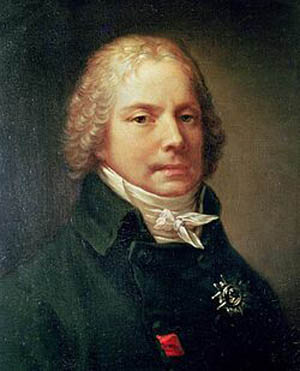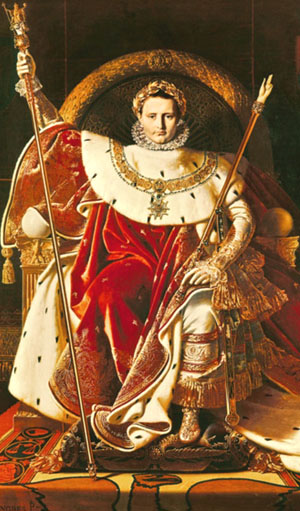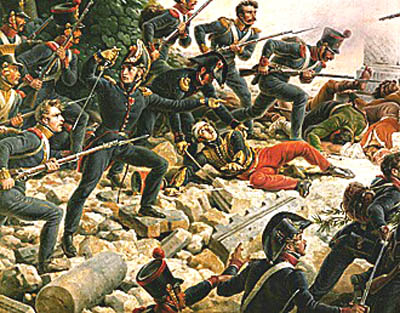 |
Organic Society
Power, Command & Influence
Plinio Corrêa de Oliveira
We can distinguish three elements in a government: power, which can come from money or force, command and influence.
Speaking of the use of force alone to govern, Talleyrand once told Napoleon that bayonets can be an efficient means to establish a throne, but it is very difficult to remain seated atop them for a long time.

Talleyrand to Napoleon: Sire, no stable throne can be seated on bayonets |
Then, what is the importance of each of these elements, power, command and influence?
Let us analyze the case of Napoleon. He was a bogus, illegitimate emperor, but while he occupied that position, it granted him the right to command and be obeyed. The people – his subjects – were obliged to obey him in certain things.
Suppose, for example, that an epidemic were to break out suddenly in France. Since Napoleon occupied the position of emperor, he would have the obligation to command and take every suitable measure to contain that plague and improve the situation of the persons infected by the disease. He would have the right and the duty to command. In this eventuality, all the State mechanisms should indisputably obey him. Therefore, he had the command.
Did he have the power? Once he had the right to command, did he have enough moral ascendancy to make himself obeyed normally, and not only in the extraordinary situation that we imagined?
The answer is affirmative. By his iron fist, he had habituated France to obey him mechanically and normally. So, through force, he acquired power.
Did he have influence? Here a different discussion begins.
One of the fundamental elements a person needs to have influence is to raise admiration in those around him.
Napoleon had won countless battles. To win a battle creates admiration, because military genius per se raises admiration. It supposes a personality capable of moving whole armies, ordering them well against the enemy, and winning. It is a chess game in which the pawns, knights and rooks are thousands of men. Napoleon knew how to do this and successfully won many battles. He had, therefore, a reason to be admired.
Further, on more than one occasion he risked his own life, and, doing so, he showed heroism. Heroism is a quality that naturally raises admiration.
He also restored order to France after the turmoil of the French Revolution, and for this he also raised the admiration of the people. They could sleep in peace without fear of being marched to the guillotine the next day. So, many persons could breathe again in peace, and they admired him for the material peace he had recovered.
Notwithstanding this admiration he raised that gave him the prestige he needed to influence, he lost that influence.
Why did Napoleon lose his influence?
There are several reasons for the loss of prestige Napoleon suffered, caused by a deterioration of the admiration for him.

Napoleon's pretension to equal Charlemagne corroded his influence |
First, he tried to execute a function that went far beyond that of a general; he pretended to be an emperor. Now, to be an emperor, a man needs to do more than just win battles. Victories in battles obviously can help, but they are not enough to make an emperor.
Charlemagne, for example, won many battles, but he was much more than a general; he was a patriarch. All of Catholic Civilization that came from Charlemagne was already contained within his soul. It overflowed, so to speak, from his person. Napoleon did not have this grandeur. His disproportionate pretension of being a new Charlemagne is perhaps the most protuberant point of his pride and contributed most to corrode the admiration he had raised.
Second, the military glory he was amassing with his many victories became more of a personal glory than something that represented the glory of France. Indeed, he was not even properly speaking French, but rather an Italian from Corsica, which only became a French territory the year he was born (1769) after being a possession of Genoa for around 500 years.
The French people began to find the price to win those battles excessively harsh and weighty: their children were dying in large, unparalleled numbers in those wars. Every victory of Napoleon was accompanied by a long list of young Frenchmen who had lost their lives.
And what was the purpose of those battles? It was mainly to acquire personal glory and to place on the thrones of Europe members of the Bonaparte family or Napoleon’s generals. Thus, he made his brother Joseph the King of Spain; his brother Lucien the King of Westphalia; his general and brother-in-law Murat, the King of Naples; his general Junot, the Governor of Portugal, and so on.
Therefore, the French people felt that it was Napoleon who was ascending on the firmament of History, and not France. Those wars were Napoleon’s wars, not France’s, but the resulting deaths belonged to France.
Third, an enormous indifference came over the French people. We must remember that at the time there was no radio, television or electricity. The best way to spread the news among the people of a great city like Paris was to toll the bells of the churches. When this happened, the people would gather in a central plaza to hear the news. So, after each battle victory, Napoleon would send a messenger by horse to Paris, the Archbishop of Paris would be notified of the victory and, through an agreement with the government, he would authorize the churches’ bells to toll.

The French victories were paid for by a heavy toll of deaths - Above, the assault of Santa Engracia, Saragossa, Spain - 1809 |
Since Napoleon’s victories became very frequent, the bells of all Paris would toll often. Historians report that the people became so tired of those victories that it became customary to ignore them. Persons conversing would not bother to stop. A man sharpening his knives in the street would continue without halting; another who was hawking his wares would keep calling out his prices. The French people had had enough of his victories.
Thus, Napoleon’s glory became a kind of spume spouting artificially over the nation, and not a plant rooted firmly in its ground.
These were the reasons why Napoleon, although he continued to have power and command, lost his influence.
Zero influence
We can see how drastically Napoleon’s influence had waned from this incident. After he was deposed and was sentenced to his first exile on the Island of Elba in the Mediterranean Sea, he had to cross France by carriage to take a ship in southern France to reach his destination. He had become so unpopular that he decided to close the curtains of the windows when the carriage would pass through some town in order not to be recognized.
Even with this precaution, however, the people of one town discovered who was in the carriage and stoned it, trying to overtake it in order to lynch him. The situation became so dangerous that he had to take refuge in an inn. In order to continue his trip, he disguised himself by wearing the uniform of an Austrian officer. Thus, by wearing the uniform of his worst enemy, the Austrian Empire, he managed to escape that critical situation to continue his shameful journey into exile.
In other words, his influence had been reduced to nothing.

Posted October 12, 2012

  | | Prof. Plinio |
Organic Society was a theme dear to the late Prof. Plinio Corrêa de Oliveira. He addressed this topic on countless occasions during his life - at times in lectures for the formation of his disciples, at times in meetings with friends who gathered to study the social aspects and history of Christendom, at times just in passing.
Atila S. Guimarães selected excerpts of these lectures and conversations from the transcripts of tapes and his own personal notes. He translated and adapted them into articles for the TIA website. In these texts fidelity to the original ideas and words is kept as much as possible.

Related Topics of Interest
 Command vs. Influence Command vs. Influence
 Fostering the Originality of Each Social Cell Fostering the Originality of Each Social Cell
 Charlemagne Charlemagne
 Formation of the Holy Roman-German Empire Formation of the Holy Roman-German Empire
 Monarchy, Aristocracy & Democracy Monarchy, Aristocracy & Democracy
 Feudalism and the Modern State Feudalism and the Modern State
 The Principle of Gradualism, The Law for Evil to Progress The Principle of Gradualism, The Law for Evil to Progress
 Two Opposed Poles of Society: Prestige and Money Two Opposed Poles of Society: Prestige and Money
 What is Organic Society? What is Organic Society?

Related Works of Interest
|
|
Organic Society | Social-Political | Home | Books | CDs | Search | Contact Us | Donate

© 2002-
Tradition in Action, Inc. All Rights Reserved
|
 |
|